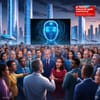Silicon Valley leaders, including White House AI & Crypto Czar David Sacks and OpenAI Chief Strategy Officer Jason Kwon, have sparked controversy with allegations that AI safety advocates are acting in their own interest or for billionaire puppet masters. These claims are seen as intimidation tactics, echoing past incidents like spreading rumors about California AI safety bill SB 1047, which was ultimately vetoed by Governor Gavin Newsom. AI safety groups view these allegations as attempts to silence critics and dissuade nonprofits from speaking out.
The controversy highlights Silicon Valley's growing tension between building AI responsibly and building it for massive consumer use. OpenAI sent subpoenas to AI safety nonprofits, like Encode, requesting communications related to Elon Musk's lawsuit and SB 53, a bill setting safety reporting requirements for large AI companies. Brendan Steinhauser, CEO of Alliance for Secure AI, believes OpenAI sees critics as part of a Musk-led conspiracy, but argues this isn't the case, and AI safety advocates are critical of xAI's safety practices.
Sacks alleged Anthropic is fearmongering to benefit itself and hinder smaller startups, while Anthropic was the only major AI lab to endorse SB 53. Sriram Krishnan, White House senior policy advisor for AI, urged AI safety organizations to engage with real-world AI users. A Pew study found half of Americans are more concerned than excited about AI, focusing on job losses and deepfakes rather than catastrophic risks.
The AI safety movement is gaining momentum, and Silicon Valley's pushback may indicate they're working. Addressing safety concerns could impact AI's rapid growth, worrying Silicon Valley, as AI investment props up America's economy. With AI's future uncertain, finding a balance between innovation and responsibility is crucial.


